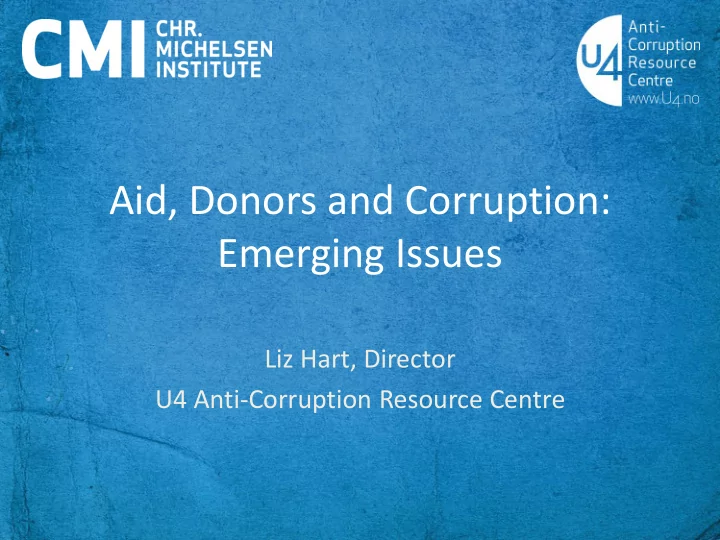

Aid, Donors and Corruption: Emerging Issues Liz Hart, Director U4 Anti-Corruption Resource Centre
Anti-Corruption in development: Evolution of practice 1 st generation: the principal-agent problem Corruption = Monopoly + Discretion – Accountability “Technical” responses—laws and institutional reforms – bureaucratic reform – PFM, civil service reform – horizontal accountability—ACAs, audit authorities Problem #1: institutional weakness, lack of knowledge/capacity Problem #2: political will
Second generation: the ”demand side” and transparency --civil society: advocacy and awareness raising --access to information: FOI laws, transparency initiatives (budget transparency) --social accountability Problem #1: Political will Problem #2: Power asymmetry & impunity
Third generation: Now what?—facing the political logic of corruption • Internationalizing the effort – International standards: UNCAC & regional conventions – Targeting the “supply side”: Natural resource revenue transparency/ governance initiatives (EITI, Kimberly, timber) – Targeting impunity: Asset recovery, cross-national prosecutions (UK, USA, EU), illicit financial flows • Can we really deal with political finance? • Sectoral approaches: defusing the politics?
What we “know” now • Maybe not so much; standard of “evidence” is low • Technical approaches are rarely successful – PFM might have a positive impact on corruption levels; SAIs – ACAs, AC strategies & AC laws have produced few meaningful changes & consumed a lot of time/money/attention • Corruption is a political phenomenon, and solutions are political • Donors have a hard time taking this on board
Fragile situations • Peacebuilding: tradeoff between buying the peace and building legitimacy? – Definition and measurement: what do people see as “corruption,” “legitimate”? • most surveys only capture petty corruption • Is aid part of the problem? – Inverse relationship between aid resources and local capacity – Dynamics of inclusion/exclusion in aid programmes – Managing expectations • Social accountability • “Mainstreaming”
Recommend
More recommend